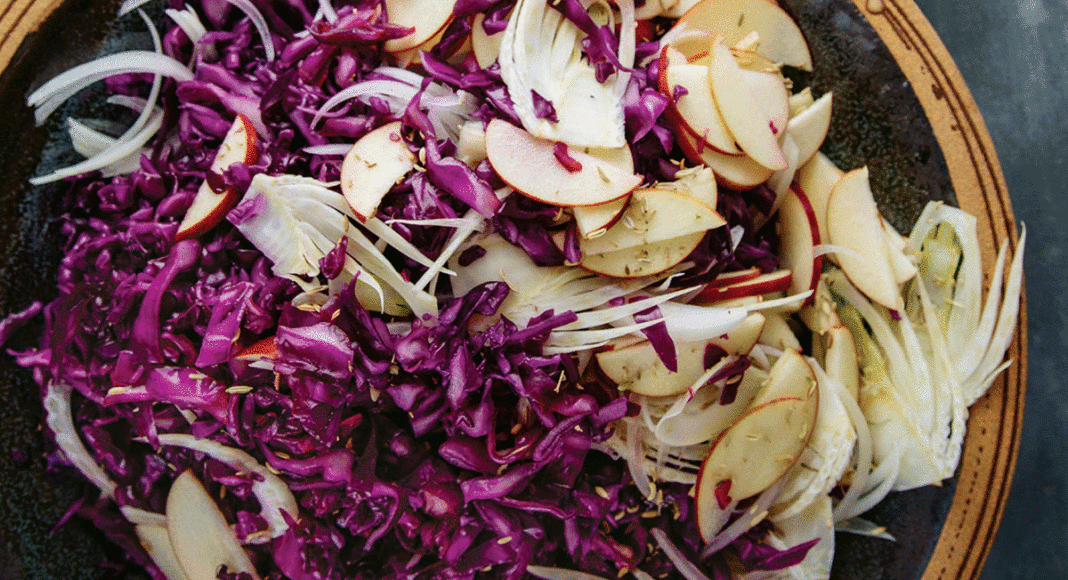I first tried the “gut shot” after Thanksgiving rendered me comatose yet again. It was the third helping of stuffing that did it, but it was Kathryn Lukas—and Vogue—that helped me to undo it with the article ”Why ‘Gut Shots’ Are the Key to Healthy Holiday Eating.” I never looked back.
Lukas is the founder of Watsonville-based Farmhouse Culture, which makes organic fermented foods. Her gut shot is sauerkraut brine, flavored or not. Though Germans and other kraut-loving Eastern Europeans have been drinking sauerkraut juice since the beginning of time, it was Lukas that popularized the “shot” in California. The vitamin-rich, probiotic sour drink can help reduce bloating and stimulate the release of enzymes to help the body digest food more efficiently, particularly if it’s overloaded. For me, it meant I could be a functioning member of society post-Thanksgiving dinner.
What began as a condiment turned into a fermentation empire for Lukas. Farmhouse Culture is perhaps best-known for its kraut, which Lukas began making in 2005. They also have Kraut Krisps (flavored chips made of cabbage) that have also been saving guts all over America.
Lukas’ interest in fermented foods led her to eventually co-author a cookbook with her son, Shane Peterson. The new book, The Farmhouse Culture Guide to Fermenting, was released in August—a mother-son collaboration where, Lukas says, styles and personalities collided.
“We use muppets to describe our personalities. I am the Swedish Chef, and he is Beaker. I’m all about getting the flavor right and throwing things in there, and he likes to measure everything as we go,” Lukas laughs. “I don’t really measure. So for the book, I come up with the ideas for the recipes—and that’s not to say he doesn’t have a few in there—then we tweak it together. He would perfect the ratios for salt or kraut juice through a lot of trial and error.”
Peterson also wrote the book Fermentering, which is a best-seller in Scandinavia. The new Farmhouse Culture book contains more than 100 recipes, including sauerkraut, kombucha and even fermented ketchup. It details the history and importance of fermented foods, and how to better incorporate them into our diets—though Lukas says that the latter is likely to be its own book further down the line. “I’m working on recipes that incorporate ferments into the everyday diet, a lot of that stuff didn’t make it into this book,” she says. “Like how to eat fermented foods with breakfast.”
When Lukas first started Farmhouse Culture, she sold at Santa Cruz farmers markets. She says she would actively avoid talking about the health benefits because she didn’t know much about it. It wasn’t until she read Michael Pollan’s 2013 New York Times article “Some of My Best Friends Are Germs” (which delves into the trillions of microbes in our bodies, and how they are linked to our overall health) that Lukas became much more interested in the gut, the microbiome and the health benefits of fermented foods. “It’s funny, when I talk to my doctors, they actually know a lot less than I do,” she says. “There are very few people in the world that know a lot about how the gut works. It’s such a fast-moving science, it’s hard to make definitive statements about it.”
The human microbiome has an estimated 100 trillion microbes, the bulk of which live in our gut. When people talk about the gut, it’s usually a reference to the processes that occur in the small and large intestines. There are viruses, fungi, parasites, bacteria and more that coexist within the intestines, similar to a bustling traffic stop. It’s when these microbiotics aren’t happily coexisting that the body starts to be susceptible to illness and disease, according to the Harvard School of Public Health.
Probiotics and prebiotics are live, active bacteria present in foods and supplements that can potentially augment symbiosis microbacteria, leading to more efficient digestion. As Lukas and Peterson’s book points out, research hasn’t quite caught up with what the “ideal” microbiome looks like, but there is speculation of a strong link between a healthy gut and a healthy person.
Probiotics should be consumed according to professional guidelines, and can lead to some pretty nasty bowel-related results if ingested too much—I know from experience. “If you are getting ready to make changes in your lifestyle, get some baseline testing to understand what’s going on with your microbiome,” Lukas says. “Then add fermented foods and fiber or whatever you want to add. Then check again and see where you are. That’s the ideal way to figure out how much fermented food is right for you.”
Particularly with the gut shot, overenthusiasm can cause unwanted distress and multiple trips to the bathroom in a short period of time. Lukas recommends starting off slowly, with a little bit of fermented food here and there.
“Try a fermented carrot, or a little bit of kimchi with a meal. Sip on a kombucha,” she says. “But for the beginner, I wouldn’t recommend eating two cups of sauerkraut in one sitting. Definitely not.”













